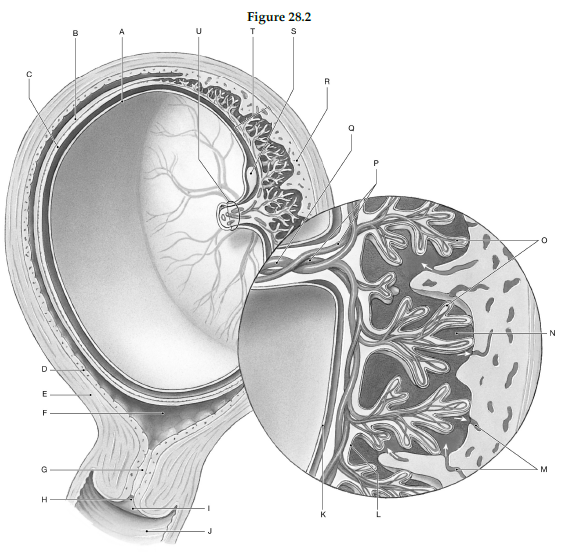Using the figure below, identify the labeled part.

1) Label A: ______________________________
2) Label B: ______________________________
3) Label C: ______________________________
4) Label D: ______________________________
5) Label E: ______________________________
6) Label F: ______________________________
7) Label G: ______________________________
8) Label H: ______________________________
9) Label I: ______________________________
10) Label J: ______________________________
11) Label K: ______________________________
12) Label L: ______________________________
13) Label M: ______________________________
14) Label N: ______________________________
15) Label O: ______________________________
16) Label P: ______________________________
17) Label Q: ______________________________
18) Label R: ______________________________
19) Label S: ______________________________
20) Label T: ______________________________
21) Label U: ______________________________
1) Amnion
2) Decidua capsularis
3) Chorion
4) Decidua parietalis
5) Myometrium
6) Uterine cavity
7) Cervical (mucous
8) External os
9) Cervix
10) Vagina
11) Amnion
12) Trophoblast (cellular and syncytial layers
13) Maternal blood vessels
14) Area filled with maternal blood
15) Chorionic villi
16) Umbilical arteries
17) Umbilical vein
18) Decidua basalis
19) Yolk sac
20) Placenta
21) Umbilical cord (cut(
You might also like to view...
The erector spinae muscles disappear at the level of the
A. umbilicus. B. crest. C. superior sacrum. D. inferior sacrum.
In males, the primary genitalia are the ________.
A. epididymides B. ureters C. seminal vesicles D. testes
If a lever has a fulcrum at one end, has a tendon exerting an effort 5 cm distal to the fulcrum, and acts against a resistance another 6 cm distal to the effort, what is its mechanical advantage?
A. 0.45 B. 11.0 C. 0.83 D. 2.2 E. 0.54
The continuation of the peritoneum that binds the small intestine and suspends it from the abdominal wall is called the ________.
A. mesentery B. greater omentum C. lesser omentum D. mesocolon E. mediastinum